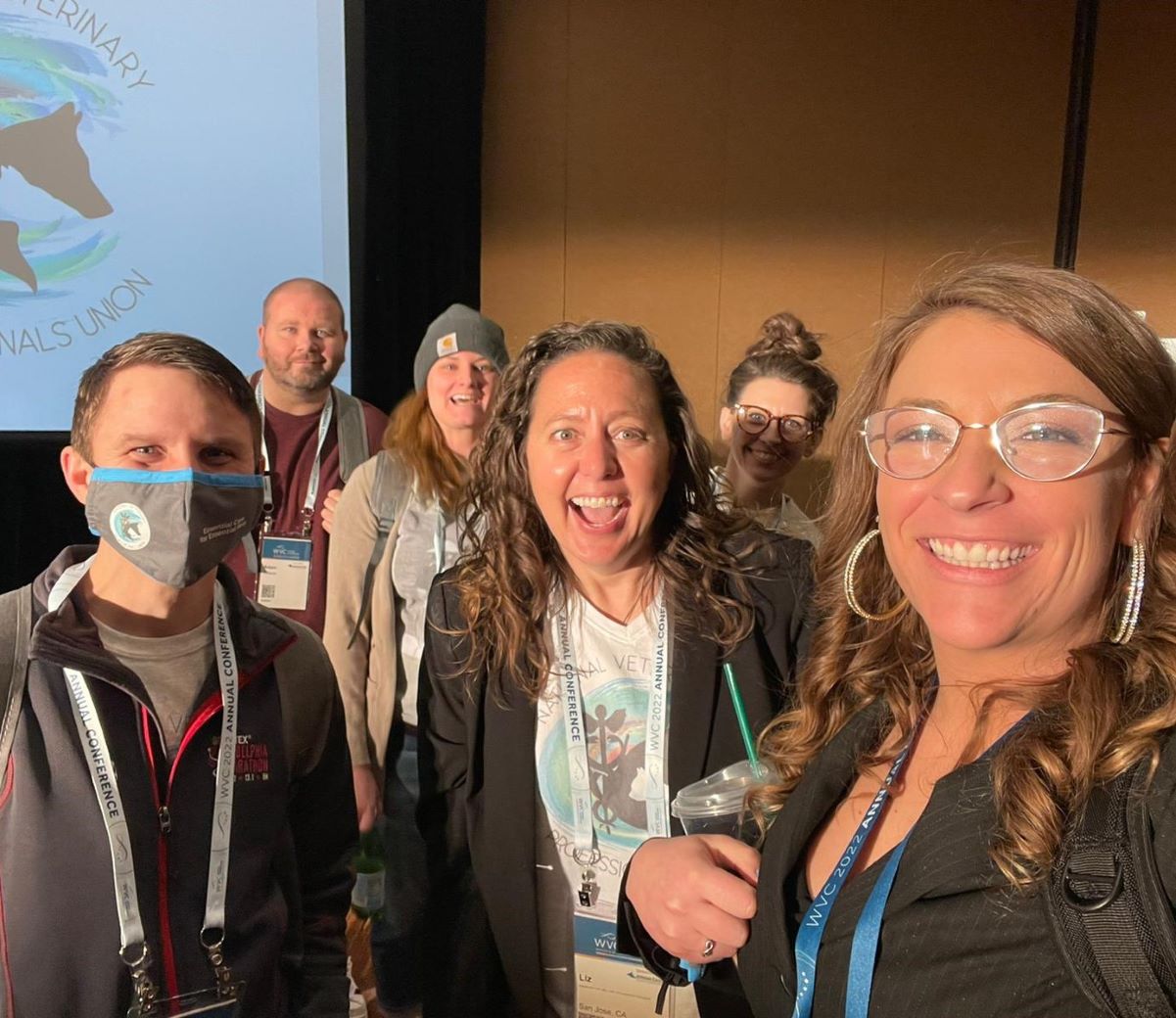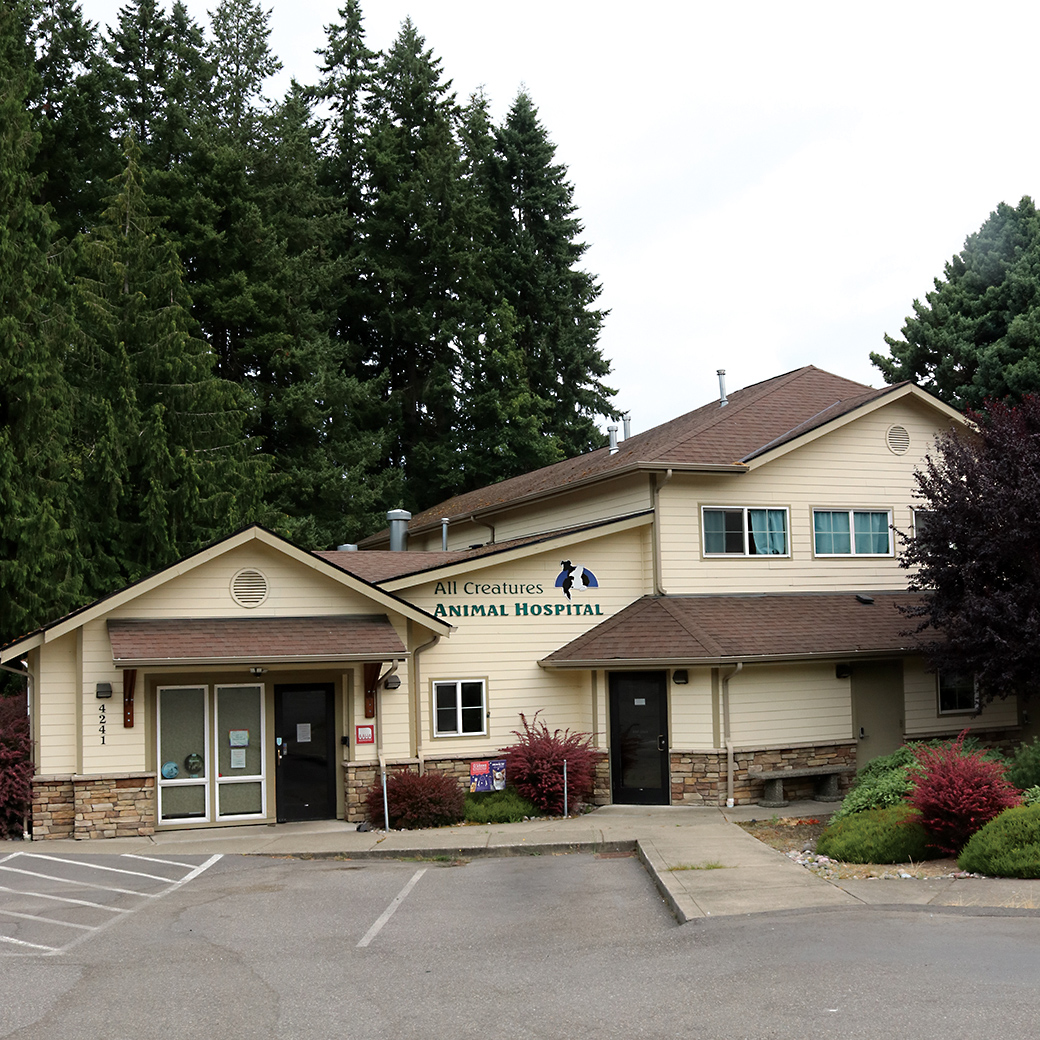 Listen to this story.
Listen to this story.
Liz_Hughston_NVPU

Photo courtesy of Liz Hughston
Liz Hughston (center) is surrounded by support staff and labor organizers at the Western Veterinary Conference in 2022 where she presented about labor efforts in veterinary medicine. Hughston led the National Veterinary Professionals Union from start to finish.
The only union dedicated solely to veterinary support staff in the United States has shuttered. Its collapse was precipitated by the closure, in May, of an animal hospital in the Seattle area, where workers represented by the National Veterinary Professionals Union (NVPU) were negotiating a collective bargaining agreement.
With the small animal practice no longer in operation, the NVPU lost its only dues-paying members. The union also was hamstrung by an inability to find people to take on leadership roles during its short history, according to a union spokesperson. On July 1, the NVPU formally told the National Labor Relations Board, the federal agency that oversees unions, that it had ceased to operate.
During its eight years in existence, workers at eight practices voted to join the NVPU or another union usually working in consultation with the NVPU to create collective bargaining units.
Organizing generally happened at consolidator-owned practices where upper management typically does not work alongside staff and can overlook or ignore discontent in the ranks, according to union organizers and staff at many of the hospitals involved.
Over the years, when asked by the VIN News Service about unionization drives, affected corporate owners generally expressed support for employees' right to organize and disappointment that they felt they needed to. Brandon Antin, former vice president of corporate affairs for VCA, a large practice consolidator with two hospitals that unionized, said in 2019: "We believe we can best resolve issues that arise by maintaining an open environment in which we can communicate directly with our associates, and our associates can communicate directly with us, without having to go through a third party."
Once aware of labor activity in a hospital, corporate owners hired law firms known for their union-busting tactics.
Half of the successful union drives came in an eventful seven-month window in 2018. However, over the years that followed, the grueling process of organizing and negotiation took a toll on the nascent movement. Votes became more sporadic, and collective bargaining agreements, also called contracts, were slow to come or didn't materialize. Today, only four of the practices that organized are still in operation, and only one has a bargaining unit and a contract.
"People want to know, 'Why don't we have unions?' " said Liz Hughston, a registered veterinary technician in the San Francisco Bay Area who led the NVPU from start to finish. "Now, I have a good idea of exactly how hard it is."
Rise and fall of the NVPU
The NVPU formed in 2017 with the goal of achieving better wages and benefits, safer working conditions and more workplace support for veterinary technicians, assistants, client-care coordinators, reception staff and other support staff.
In an interview with VIN News at the time, Hughston described the early momentum as organic and happening on social media where veterinary team members, especially technicians and assistants, vented about not being valued for their training or abilities; being expected to do a lot more with a lot less; and the challenges of getting by on low salaries — issues that have troubled technicians and other support staff for years.
Soon after launching, the NVPU worked with the International Longshore and Warehouse Union (ILWU), which primarily represents dockworkers and warehouse employees on the West Coast and in Hawaii. Together, they racked up an early string of wins as employees at four emergency and specialty hospitals on the West Coast voted to join unions between April and October of 2018.
The hospitals bore prominent names in veterinary medicine: BluePearl and VCA, which are owned by Mars Inc., and PetVet Care Centers, owned by Kohlberg Kravis Roberts, a private equity firm.
A VCA hospital in San Francisco and a BluePearl hospital in Seattle were closed before contracts were adopted. Contracts set the terms and conditions of employment as agreed to by the union members and the employer. First contracts can take years to ratify and are typically renegotiated every few years.
Employees at another VCA hospital, this one in Oregon, decided they no longer wanted to be represented by the ILWU after bargaining for nearly three years without getting to a contract. It's not unusual for protracted negotiations to undermine the morale and cohesion of a bargaining unit, according to the Economic Policy Institute, an economic justice advocacy group.
Of the first four hospitals where staff unionized, only the bargaining unit at the PetVet-owned Columbia River Veterinary Specialists in southwestern Washington remains today, with workers represented by the ILWU.
It would be three years after the first flurry of votes before staff at another hospital unionized. In 2021, workers at All Creatures Animal Hospital in Bremerton, Washington, joined the NVPU. They ratified a contract in 2023 and were negotiating a second contract when the owners closed the practice in May.
Veterinary support staff
pro-union votes 2018-2025
The three most recent votes to unionize were held at practices in Buffalo and Rochester, New York, in 2022 and in Chicago in 2023. None resulted in a contract. The Rochester hospital was closed in 2022. At the Buffalo and Chicago practices, the relationship between the union and the bargaining unit was ended at the request of the union in the former case and of the employees in the latter. The NVPU was not involved with the Buffalo labor effort.
'It's really, really, really hard'
The recent history of veterinary organizing illustrates some of the challenges inherent in the process.
"It's really, really, really hard to create a union and to make it go," said Dr. David Gill, a retired veterinarian in Seattle. "And when you have the power and money behind these corporations that can hire these lawyers and do all these maneuvers, it's near to impossible."
Gill worked at the BluePearl practice in Seattle before and after it was acquired by the corporation, and before and after employees voted to join NVPU in 2018. Rare for a veterinarian, he played a public role in supporting the labor effort, serving as a member of the NVPU steering committee when the union launched.
Learning that the NVPU had gone under, he said, "makes me sad because they were trying to improve things for everybody, but frankly, it's not surprising from what I've learned about how difficult it is to create a union and to keep it going. I'm shocked there are any unions left in this country."
Gill said he was fired in 2020 after expressing his frustration with management a few too many times.
Hughston said difficulty finding leaders was perhaps the biggest challenge for the union. In the eight years that she served on the NVPU executive board, the unpaid positions were never fully filled.
"We couldn't find people who were interested in stepping into that role," she said. "We couldn't make it attractive enough or overcome the fear or whatever it might be to get people to come and take over the leadership of it."
Technicians continue to struggle
Veterinary technicians were the driving force behind the recent spate of organizing, and the dissolution of the NVPU comes at a time when they continue to struggle, by some measures more than ever. A 2024 survey by the National Association of Veterinary Technicians of America found increased unhappiness among its members. Of 1,404 respondents, 8% reported being "extremely satisfied" with their jobs, a decline from 25% in 2022.
The top source of dissatisfaction was salary, cited by 56% of respondents as the most significant issue facing veterinary technicians. The average annual gross income reported in the survey is $53,759. The median pay for technicians, according to the U.S. Bureau of Labor Statistics, is $45,980.
Kendra Helm, an ILWU organizer, said she still hears from veterinary staff interested in organizing their hospitals. In addition, in the last couple of years, veterinary workers at nonprofit animal shelters in Chicago and Austin, Texas, have been among the employees voting to join the International Association of Machinists and Aerospace Workers.
Technicians protesting wage disparities in another sphere — education — made headlines last week with a protest at the University of California, Davis, Veterinary Medical Teaching Hospital. The workers, part of the University Professional and Technical Employees Communication Workers of America Local 9119, reportedly complained that their wages did not compete with those of area specialty clinics and claimed that understaffing was putting animal care at risk. The protest is part of a larger labor dispute between the UC system and the union, which began contract negotiations last year.
Final straw
Early union votes took place at practices owned by some of the largest veterinary hospital owners in the country. In contrast, All Creatures — the practice that closed in May — was owned by a comparatively small company. Cara Veterinary, a private entity established in 2019, had bought the practice from an independent owner-operator in 2020, bringing its total number of practices to six. Today, Cara owns 10 practices in western Washington.
The ramp-up to All Creatures' labor vote followed a familiar pattern. Soon after taking over, Cara began cutting benefits, including paid time off and sick leave, as well as wages, according to employees active in the union effort. Workers felt their complaints to management weren't heard, and so they turned to organizing.
After forming a bargaining unit, they went on to ratify a contract in 2023. It was during negotiations for a follow-up contract that the company announced in April that it would close. Union organizers said they were surprised by the announcement.
Dr. Peter Brown, senior adviser and co-founder of Cara, said in an email to VIN News that the decision to close the practice was "not made lightly" and that the owners "were unable to find a feasible business model" to continue.
He cited several factors for the decision, including "persistent and significant challenges in recruiting DVMs and support staff." He also said, "The difficult decision to close All Creatures Animal Hospital was not due to the fact the support team was under a collective bargaining agreement."
Union officials are skeptical. ILWU's Helm, who worked with the All Creatures bargaining unit, said, "We suspect they closed because of unionization. But it would be hard to prove that."
All_Creatures_closed_2

Photo by Sol Volute
A sign on the door of All Creatures Animal Hospital, located in western Washington, says the location is permanently closed.
Various labor representatives have told VIN News over the years that closing a location to kill a union happens all the time. In recent years, Starbucks and Amazon have closed coffee shops and warehouses, respectively, after the employees organized. In addition to Mars-owned BluePearl and VCA practices that closed after union votes, Thrive Pet Healthcare, with 380 practices in 37 states, closed a practice in Rochester, New York, following a vote of its staff to unionize.
Hughston said that for large companies, eliminating one location isn't a big deal. "It just doesn't make an impact," she said. "It's not like cutting off an arm; it's like cutting a fingernail. It's just meaningless to them, and they don't care about the impact a closure has on their clients or the animals the staff has cared for."
Whether that holds true for a smaller company like Cara, with 10 practices, is harder to say.
Helm said she would miss working with the All Creatures staff. "They were a tight crew," she said. "They were very into their solidarity."
Her efforts on behalf of veterinary support staff in the Pacific Northwest continue. ILWU Local 5 also represents workers at the PetVet-owned Columbia River Veterinary Services. The practice's employees are working under their second union contract. If all goes according to plan, they'll begin negotiating their third next year.
In the meantime, Helm advocates for members of the bargaining unit who have issues with management.
This is precisely the role that Hughston had always imagined for a union, and she hopes the example will serve to inspire, even though NVPU is gone.
"I know that we gave people a lot of hope," she said. "We encouraged support workers to stand up for themselves and for their worth. I feel like that's how we made a difference."